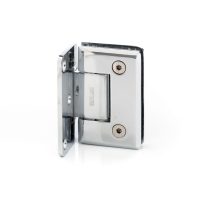Shower Hinges are essential components in the construction of frameless shower enclosures, providing the necessary support and pivot points for glass shower doors. These hinges play a crucial role in both the functionality and aesthetics of the shower, making them a significant consideration in bathroom design. In this comprehensive guide, we will explore the concept, types, benefits, and considerations related to shower hinges, focusing on how they can be used effectively in Estron’s bathroom products.
Understanding Shower Hinges:
Shower hinges, also known as shower door hinges, are specialized hardware components designed to connect glass shower doors to the wall, floor, or other fixed glass panels. They serve several important functions:
-
Pivot Point: Shower hinges provide a pivot point for the shower door, allowing it to swing open or closed. This pivotal function ensures ease of access and exit from the shower.
-
Support: Hinges support the weight of the glass shower door, ensuring it remains securely in place. Properly installed hinges contribute to the structural integrity of the shower enclosure.
-
Aesthetic Integration: Shower hinges are visible elements in a frameless shower enclosure, contributing to the overall design and style of the bathroom. They can add a contemporary, minimalist touch or complement the bathroom’s aesthetics.
Types of Shower Hinges:
Shower hinges come in a variety of types, each with its own design, features, and installation requirements. Here are some common types of shower hinges:
-
Wall-Mounted Hinges: These hinges are attached to the bathroom wall, providing a fixed point for the shower door to pivot around. Wall-mounted hinges are suitable for single-panel glass doors or for use with additional fixed panels in larger shower enclosures.
-
Glass-to-Glass Hinges: Glass-to-glass hinges connect the Sliding Door System to a fixed glass panel. These hinges are used when a door is part of a larger enclosure, typically in a corner or alcove shower design. They allow the door to swing open and closed while maintaining a seamless, frameless appearance.
-
Floor-Mounted Hinges: Floor-mounted hinges are attached to the bathroom floor. They are commonly used in conjunction with wall-mounted hinges for added stability and support, particularly with heavy or oversized glass shower doors.
-
Center Mount Hinges: Center mount hinges are positioned centrally between two glass panels. They create a pivoting point for each panel, allowing them to swing in either direction. Center mount hinges are often used in designs where two doors meet in the middle.
-
Hydraulic Hinges: Hydraulic hinges are equipped with a hydraulic mechanism that controls the opening and closing of the shower door. These hinges provide a smooth and controlled movement, eliminating the risk of the door slamming shut.
-
Self-Closing Hinges: Self-closing hinges are designed to automatically close the shower door after it is opened. These hinges are a practical choice for ensuring that the shower door remains closed securely to prevent water leakage.
Benefits of Shower Hinges:
Shower hinges offer several benefits when used in bathroom design:
-
Design Versatility: The various types and designs of shower hinges allow for a wide range of customization, making them suitable for different bathroom styles and sizes.
-
Smooth Operation: Well-maintained shower hinges provide a smooth and effortless operation, ensuring easy access to the shower and preventing wear and tear on the glass door.
-
Stability: Properly installed shower hinges offer stability and support, contributing to the overall safety and structural integrity of the shower enclosure.
-
Aesthetics: Shower hinges can enhance the aesthetics of the bathroom, with options available in various finishes, such as polished chrome, brushed nickel, or matte black, to complement the bathroom’s decor.
-
Sealing and Waterproofing: Some shower hinges include features like gaskets and seals that help improve the water-tightness of the shower enclosure, minimizing the risk of leaks and water damage.
Considerations When Choosing Shower Hinges for Estron:
-
Design Compatibility: Consider the overall design and style of the bathroom when selecting shower hinges for Estron’s bathroom products. Ensure that the hinges complement the desired aesthetic and blend harmoniously with other fixtures and finishes.
-
Glass Thickness: Shower hinges are designed to accommodate specific glass thicknesses. Ensure that the selected hinges are compatible with the thickness of the glass panels used in Estron’s shower enclosures to ensure a secure fit.
-
Weight Capacity: Different shower hinges have varying weight capacities. When selecting hinges, consider the weight of the glass shower door and any additional components, such as handlebars or towel racks, to ensure the hinges can support the load effectively.
-
Functionality: Determine the desired functionality of the shower door. For example, if a self-closing feature is preferred for Estron’s bathroom products, consider shower hinges that offer this option.
-
Finishes: Shower hinges come in a variety of finishes, including chrome, brushed nickel, bronze, and black. Choose a finish that complements Estron’s bathroom product design and other bathroom fixtures.
-
Installation: Proper installation is critical to ensure the performance and safety of shower hinges. It is recommended to have the hinges installed by experienced professionals or in accordance with Estron’s installation guidelines.
In Conclusion:
shower hinges are essential components in the construction of frameless shower enclosures, offering stability, functionality, and design versatility. When choosing shower hinges for Estron’s bathroom products, careful consideration of design compatibility, glass thickness, weight capacity, functionality, finishes, and proper installation is essential. Well-selected shower hinges contribute to the overall aesthetics and functionality of the bathroom while ensuring the safety and durability of the shower enclosure.


